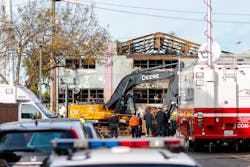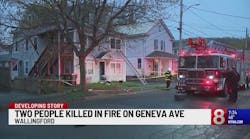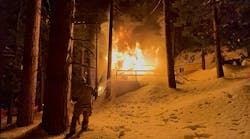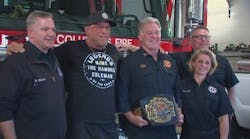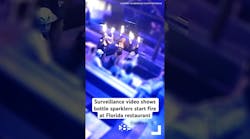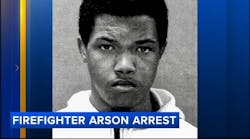May 14--OAKLAND -- A veteran Oakland Fire Department captain who inspected the Ghost Ship warehouse in September 2014 came away with so many safety concerns that he said he wrote a report detailing the potentially disastrous conditions.
But Fire Capt. George Freelen said he was told by master tenant Derek Almena during the visit that no one lived at the building, which later went up in flames on Dec. 2, 2016, killing 36 people, most of whom were gathered for a dance party.
"I asked him if he lived there. He said he did not," Freelen testified Tuesday afternoon about Almena. "I asked him if anyone else lived there," he said, and Almena's response was, "No."
Freelen testified in the second week of the Alameda County Superior Court trial against Almena, 49, and Max Harris, 29, who are each charged with 36 counts of involuntary manslaughter stemming from the blaze at the warehouse in East Oakland's Fruitvale neighborhood.
On the witness stand, Freelen said he was in charge of Station No. 13, about a block away from the Ghost Ship collective. After a fire was reported at the Ghost Ship in September 2014, Freelen and three other fire department officials paid a visit to the collective a "couple of days later," he said. He asked Almena -- whom he had met before at the fire station -- if he and the others could have a look around. He said the purpose of the visit was a "pre-planning" inspection, or what the fire department would do in the event of a fire in the building.
What he saw was a mass of wood structures and products -- which he described as "medium to high" risk of fireload, two RVs, pianos, organs, old windows covering walls and no fire extinguishers, no smoke alarms, no fire alarms and no visible fire exit.
Freelen also said he saw "10 to 12" people in the building and one or two people outside. "I wasn't sure what fire codes would apply, what occupancy rules would apply," he testified. Freelen said he went back to the fire station and wrote up a report, listing the concerns. But, on cross-examination by defense attorneys Curtis Briggs and Tony Serra, he said he never went back to the Ghost Ship until a day after the fire on Dec. 2, 2016, when he worked up to 16 hours with other fire department staff clearing debris, identifying victims and charting where each body was found.
"It was a very humbling experience," he said, looking down and speaking quietly. "It's been challenging to understand what happened."
Freelen testified that he never followed up on his concerns after being told by Almena that no one lived at the Ghost Ship. He also said he didn't cite Almena or issue a warning about fire safety, but told him to get fire extinguishers "to make it safe for the people there."
In December 2017, Oakland Fire Marshal Miguel Trujillo said in the preliminary hearing that Freelen's report doesn't exist. The city also could not produce the document when asked by this news organization, and it was never included in documents released by the city in the months following the fire.
Earlier Tuesday, a man who lived at the Ghost Ship collective repeatedly broke down on the stand as he recalled his "traumatizing" visit after the fatal fire that claimed 36 lives on Dec. 2, 2016. David "Dragon" Calvera, 29, and his girlfriend Leah "Swan" Vega were residents at the Ghost Ship, but both were not there when it caught fire because they were working elsewhere.
Calvera learned about the warehouse fire via text four hours later. Calvera broke down as he described seeing the ruins and spoke about the "emotional turmoil" and the series of funerals that followed.
Alameda County Assistant District Attorney Casey Bates alleged in his opening statement that Almena and Harris are criminally liable for the fire because there was no time and no way for the people at the dance party to escape since the warehouse didn't have important safeguards, such as fire extinguishers, smoke alarms and exit signs.
Bates also said Almena and Harris violated the terms of the warehouse's lease by turning it into a living space and hosting music parties there. Defense attorneys repeatedly have described Almena and Harris as "scapegoats" and have suggested the city of Oakland and its fire and police departments are culpable for the deadly blaze.
Calvera described the interior as a cross between "Swiss Family Robinson" and "Pirates of the Caribbean" and "really cool" with an eclectic collection of artwork, including Indian mythological figures.
"It was a dream come true," Calvera recalled. He said he and Vega lived with about 25 other people and there was a "family atmosphere."
Earlier Tuesday, musician Aaron Marin described how he first smelled smoke and then escaped by jumping from a second-story kitchen window as the warehouse went up in flames.
Tony Serra, Almena's attorney, asked Marin how much time elapsed from when he first smelled smoke to when the lights went out. "I think about that every day of my life -- it was a matter of minutes, maybe two, three minutes," Marin responded.
Marin, who lived at the Ghost Ship for a few weeks before the fire, said he saw people going up and down the two staircases, bringing musical equipment on Dec. 2, 2016. He said there was "no problem with the stairs" and he found them to be sturdy.
"I think it was awesome," Marin said of the Ghost Ship interior, with "beautiful things to look at, spiritual things," including what he described as multicultural art, with Indian lanterns and Indonesian masks and street art.
___ (c)2019 the Contra Costa Times (Walnut Creek, Calif.) Visit the Contra Costa Times (Walnut Creek, Calif.) at www.eastbaytimes.com Distributed by Tribune Content Agency, LLC.
